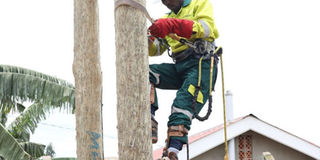Government signs contracts to extend power to West Nile

West Nile has for years depended on thermal electricity generated by Wenreco. PHOTO | FILE
After years of unreliable power, districts in the West Nile region will in two years have access to grid electricity as Uganda Electricity Transmission Company Limited (UETCL) builds substations and transmission lines in the region.
West Nile has for years been dependent on thermal power generated by West Nile Rural Electrification Company (Wenreco).
The regional leaders say the region is plagued by rampant outages and high power tariffs.
However, according to Electricity Regulatory Authority (ERA), the entity responsible for setting power tariffs, the rates charged by Umeme for instance Shs750.9 per unit for domestic consumers, are the same as those by Wenreco.
Uganda Bureau of Statistics 2018 put the total population of West Nile region at 2.9m people.
Speaking during the contract signing between government and the contractors, Ms Pamella Byoruganda, the UETCL spokesperson, said the project is expected to solve electricity challenges in Kole, Gulu, Nebbi, Paidha, Arua and other districts in West Nile.
“We have signed a grid expansion project coming from Lira to Kole, Nebbi, Gulu and Arua. We shall have substations at Lira. Kole will be a switchyard, Nebbi and Arua will also have a substation,” she said.
The projects will be implemented by KEC International Limited (India) and a joint venture of AVIC International Holding Corporation and Central Southern China Electric Power design Insitute Company Limited.
The electricity will be drawn from Nyagak and Karuma dams.
The project is expected to take two years, however, Mr Peter Ucanda, UETCL chairman urged the contractors to quickly deliver the project.
Ms Mary Goretti Kitutu, the Energy minister, committed her support to ensure that electrification to West Nile is realised.
Investment minister Evelyn Anite, welcomed the move, saying extension of the grid to West Nile will attract more investors to the region.
Existing investors in the region, such as Meridian Tobacco, which employs multiple people in Arua, had threatened to close shop due to lack of reliable power and high power tariffs.
Ms Anite said, running a factory on a generator for factories such as Leaf Tobacco, which processes tobacco, was difficult and had threatened “to close at one point because the power tariffs were so high and the electricity was unreliable”.
Claims of sabotage
The Energy sector has also decried delays caused by whistle blowers, saying some of them only seek to sabotage government works and delay projects.
Ms Anite said at some point, whistleblowers had claimed that Arua did not have the ability to absorb energy.
Whistleblowing, she claimed is instigated by elements in the Opposition to fail government attempts to power West Nile.
“They knew that they had succeeded and quickly ran with placards saying ‘no electricity, no votes’. We are very happy that we have defeated them again as we have always done,” she said.




